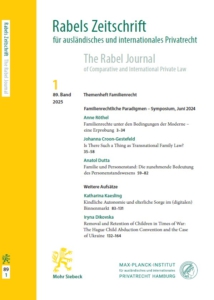Views
Standard (and burden) of proof for jurisdiction agreements
Courts are often required to determine the existence or validity of jurisdiction agreements. This can raise the question of the applicable standard of proof. In common law jurisdictions, the question is not free from controversy. In particular, Stephen Pitel has argued on this very blog that jurisdiction clauses should be assessed on the balance of probabilities, as opposed to the “good arguable case” standard that is commonly applied (see, in more detail, Stephen Pitel and Jonathan de Vries “The Standard of Proof for Jurisdiction Clauses” (2008) 46 Canadian Business Law Journal 66). That is because the court’s determination on this question will ordinarily be final – it will not be revisited at trial.
China’s Draft Law on Foreign State Immunity—Part II
Written by Bill Dodge, the John D. Ayer Chair in Business Law and Martin Luther King Jr. Professor of Law at UC Davis School of Law.
In December 2022, Chinese lawmakers published a draft law on foreign state immunity, an English translation of which is now available. In a prior post, I looked at the draft law’s provisions on immunity from suit. I explained that the law would adopt the restrictive theory of foreign state immunity, bringing China’s position into alignment with most other countries.
In this post, I examine other important provisions of the draft law, including immunity from attachment and execution, service of process, default judgments, and foreign official immunity. These provisions generally follow the U.N. Convention on Jurisdictional Immunities of States and Their Property, which China signed in 2005 but has not yet ratified.
China’s draft provisions on immunity from attachment and execution, service of process, and default judgments make sense. Applying the draft law to foreign officials, however, may have the effect of limiting the immunity that such officials would otherwise enjoy under customary international law. This is probably not what China intends, and lawmakers may wish to revisit those provisions before the law is finally adopted. Read more
What is a Judgment (in the context of Reg 655/2014)? – CJEU Case C-291/21 Starkinvest
Less than half a year after the CJEU’s decision in Case C-646/20 Senatsverwaltung für Inneres (discussed here by Krzysztof Pacula), the Court had to engage again with the question of what constitutes a “judgment” in the sense of an EU instrument in Case C-291/21 Starkinvest.
This time, the question arose in the context of Regulation 655/2014 establishing a European Account Preservation Order procedure to facilitate cross-border debt recovery in civil and commercial matters. The regulation envisages two kinds of situation:
- The creditor has already obtained a “judgment” (Art. 7(1)): In this case, the creditor only needs to show that there is an urgent need for a protective measure to ensure that the judgment can be effectively enforced against the debtor.
- The creditor has not yet obtained a “judgment” (Art. 7(2)): In this case, the creditor also needs to show “that he is likely to succeed on the substance of his claim against the debtor”.
In Starkinvest, the claimant had obtained a decision from the Tribunal de commerce de Liège, Belgium, that ordered the debtor to cease seeling certain goods, subject to a penalty payment of EUR 2 500 per breach. On the basis of that decision, they later sought payment of EUR 85 000 in penalties, which they requested the referring court to secure through a European Account Preservation Order. Confronted with the question of how to characterise the initial decision in the context of the above dichotomie, the court referred the case to the CJEU.
News
Out now: Festschrift für Thomas Rauscher
Prof. Dr. Dr. h.c. Thomas Rauscher, formerly a professor of private international law at the University of Leipzig (Germany) and still one of the most prolific commentators on German and European PIL, has been honoured by a Festschrift on the occasion of his 70th birthday. The volume, titled “Europeanization of private law”, has 623 pages and is published by CH Beck (Munich). It contains numerous contributions on private international law, comparative law and international civil procedure. The authors come from various countries, including Germany, Austria, Hungary, the United States and Vietnam. Most contributions are in German. For further information and a table of contents, please click here.
New issue alert: RabelsZ 89(2005)
 Issue 1/2025 of RabelsZ has just just been released. It contains the contributions to a family law symposium held at the Max Planck Institute in Hamburg in June 2024. All content is Open Access: CC BY 4.0 and more articles are available Online First.
Issue 1/2025 of RabelsZ has just just been released. It contains the contributions to a family law symposium held at the Max Planck Institute in Hamburg in June 2024. All content is Open Access: CC BY 4.0 and more articles are available Online First.
Anne Röthel, Preface to this family law special, pp. 1–2, https://doi.org/10.1628/rabelsz-2025-0003
AMEDIP’s upcoming webinar: Private International Law in the Inter-American system: A glance in the light of the 50 anniversary of the CIDIP (27 February 2025 – in Spanish)

The Mexican Academy of Private International and Comparative Law (AMEDIP) is holding a webinar on Thursday 27 February 2025 at 14:30 (Mexico City time – CST), 21:30 (CET time). The topic of the webinar is ‘Private International Law in the Inter-American system: A glance in the light of the 50 anniversary of the CIDIP’ and will be presented by OAS Director Dante Negro (in Spanish).
CIDIP is the Spanish acronym for the Inter-American Specialized Conferences on Private International Law. For a history of the CIDIP, click here. Read more


